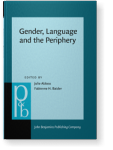Fabienne H. Baider
List of John Benjamins publications for which Fabienne H. Baider plays a role.
Book series
Titles
Hate speech: Definitions, interpretations and practices
Edited by Fabienne H. Baider, Sharon Millar and Stavros Assimakopoulos
Special issue of Pragmatics and Society 11:2 (2020) v, 165 pp.
Subjects Discourse studies | Pragmatics | Sociolinguistics and Dialectology
Gender, Language and the Periphery: Grammatical and social gender from the margins
Edited by Julie Abbou and Fabienne H. Baider
[Pragmatics & Beyond New Series, 264] 2016. vi, 411 pp.
Subjects Pragmatics | Semantics | Theoretical linguistics
Linguistic Approaches to Emotions in Context
Edited by Fabienne H. Baider and Georgeta Cislaru
[Pragmatics & Beyond New Series, 241] 2014. vi, 358 pp.
Subjects Pragmatics | Theoretical linguistics
2020 Pragmatics lost? Overview, synthesis and proposition in defining online hate speech Hate speech: Definitions, interpretations and practices, Baider, Fabienne H., Sharon Millar and Stavros Assimakopoulos (eds.), pp. 196–217 | Article
This article argues for a definition of online hate speech as a contextualised speech act that is part of a social process of alienation. It suggests that hate speech comes in degrees, is contextual, involves already existing power dynamics, and ‘others’ its targets by creating in/out groups. I… read more
2020 Introduction: Defining, performing and countering hate speech Hate speech: Definitions, interpretations and practices, Baider, Fabienne H., Sharon Millar and Stavros Assimakopoulos (eds.), pp. 171–176 | Introduction
2020 Covert hate speech: A contrastive study of Greek and Greek Cypriot online discussions with an emphasis on irony Discourses of aggression in Greek digitally-mediated communication, Hatzidaki, Ourania and Ioannis E. Saridakis (eds.), pp. 262–287 | Article
Previous research on extremist discourse has revealed that racism is linguistically shaped by its socio-cultural context. For instance, a comparison between Greek Cypriot and Greek online data indicated that the two communities use different linguistic means and strategies to express their… read more
2019 Thinking globally, acting locally: Analyzing the adaptation of mainstream supremacist concepts to a local socio-historical context (ELAM in Cyprus) Language Aggression in Public Debates on Immigration, Musolff, Andreas (ed.), pp. 5–31 | Chapter
The aim of this study is to show how trans-national right-wing linguistic strategies and global xenophobic attitudes are reworked at national levels, and how, as a result, specialized country- and culture-specific coercion and legitimization strategies arise. Using a detailed,… read more
2017 Thinking globally, acting locally: Analyzing the adaptation of mainstream supremacist concepts to a local socio-historical context (ELAM in Cyprus) Public Debates on Immigration, Musolff, Andreas (ed.), pp. 178–204 | Article
The aim of this study is to show how trans-national right-wing linguistic strategies and global xenophobic attitudes are reworked at national levels, and how, as a result, specialized country- and culture-specific coercion and legitimization strategies arise. Using a detailed,… read more
2017 Gender role reversal in political debate? French politicians’ verbal and para-verbal strategies during the socialist primaries Language and Dialogue 7:2, pp. 189–212 | Article
Focusing on the Aubry – Hollande debate that took place in the context of the 2011 French socialist party primaries, we observe a possible reversal of gender stereotypes and examine word choices as well as more subtle cues such as interruptions, hedges, etc. If the debate could be described as a… read more
2017 Chapter 4. “Burn the antifa traitors at the stake…”: Transnational political cyber-exchanges, proximisation of emotions Current Issues in Intercultural Pragmatics, Kecskés, István and Stavros Assimakopoulos (eds.), pp. 75–102 | Chapter
The present contribution examines the use of lingua franca in a transnational computer mediated corpus, focusing on the extreme-right Greek political party Golden Dawn. Our data include the visual identities, pseudonyms and verbal comments of discussants. We investigate the processes through which… read more
2017 Chapter 12. “At night we’ll come and find you, traitors”: Cybercommunication in the Greek-Cypriot ultra-nationalist space Greece in Crisis: Combining critical discourse and corpus linguistics perspectives, Hatzidaki, Ourania and Dionysis Goutsos (eds.), pp. 413–454 | Chapter
Borrowing concepts from traditional semiotics, lexical semantics and critical discourse analysis, this chapter examines how the concept of “nationhood” is constructed via texts, as well as avatars and pseudonyms of Golden Dawn and ELAM (its Greek Cypriot counterpart) followers in virtual… read more
2016 Periphery, gender, language: An introduction Gender, Language and the Periphery: Grammatical and social gender from the margins, Abbou, Julie and Fabienne H. Baider (eds.), pp. 1–22 | Article
2014 Bad feelings in context Linguistic Approaches to Emotions in Context, Baider, Fabienne H. and Georgeta Cislaru (eds.), pp. 189–212 | Article
This article reevaluates Wierzbicka’ s definition (1998) for anger, and includes a proposal regarding cross-cultural data collection in the framework of the Natural Semantic Metalanguage model (see Wierzbicka 1991 and 1999). Since in order to write a NSM definition, it is imperative to identify… read more
2014 Linguistic approaches to emotion in context Linguistic Approaches to Emotions in Context, Baider, Fabienne H. and Georgeta Cislaru (eds.), pp. 1–18 | Introduction
2009 Lexical change, discourse practices and the French press: Plus ça change, plus c’est la même chose? Language Variation – European perspectives II: Selected papers from the 4th International Conference on Language Variation in Europe (ICLaVE 4), Nicosia, June 2007, Tsiplakou, Stavroula, Marilena Karyolemou and Pavlos Pavlou (eds.), pp. 27–46 | Article
Widespread demands for women’s greater ‘linguistic presence’ in the Frenchspeaking world have resulted in policies of feminising professional nouns such as la députée “deputy-FEM” or la ministre “minister-FEM”. The feminisation policy has proven successful, as evidenced in the recent journalistic… read more










